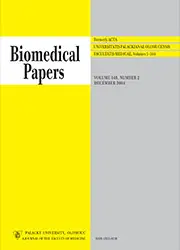Multiple sclerosis is a serious neuroimmunological disease and data on its incidence and treatment are systematically and longitudinally evaluated by the national ReMuS registry. Trends in the treatment of patients in the Czech Republic were discussed by Dominika Št'astná, MD, Ph.D. from the General University Hospital in Prague in her article published in the professional journal Biomedical Papers.

Stastna, D., Drahota, J., Lauer, M., Mazouchova, A., Menkyova, I., Adamkova, J., Ampapa, R., Dufek, M., Grunermelova, M., Hradilek, P., Kubala Havrdova, E., Mares, J., Martinkova, A., Pavelek, Z., Peterka, M., Recmanova, E., Rockova, P., Stetkarova, I., Stourac, P. , Vachova, M., Horakova, D. (2023). The Czech National MS Registry (ReMuS): data trends in multiple sclerosis patients whose first disease-modifying therapies were initiated from 2013 to 2021. And Biomedical Papers. Palacky University Olomouc. https://doi.org/10.5507/bp.2023.015 PMID: 37114703
Abstract
Aims: Multiple sclerosis treatment strategies are changing in the Czech Republic. According to data from 2013-2021, the proportion of patients starting high-efficacy disease-modifying therapies is increasing. In this survey, we describe the actual data trends in multiple sclerosis (MS) patients beginning their first disease‑modifying therapies (DMTs) from 2013 to 2021. The secondary objective was to present the history, data collection, and scientific potential of the Czech National MS registry (ReMuS).
Methods: First, using descriptive statistics, we analysed the data for patients starting their first DMTs, either platform (including dimethyl fumarate) or high-efficacy DMTs (HE-DMTs), for each successive year. Second, a detailed description of the history, data collection, completeness, quality optimising procedures, and legal policies of ReMuS is provided.
Results: Based on the dataset from December 31, 2021, the total number of monitored patients with MS in ReMuS increased from 9,019 in 2013 (referred from 7 of 15 MS centres) to 12,940 in 2016 (referred from all 15 Czech MS centres) to 17,478 in 2021. In these years, the percentage of patients treated with DMTs in the registry ranged from 76 to 83%, but the proportion of patients treated with HE-DMTs changed from 16.2% in 2013 to 37.1% in 2021. During the follow-up period, a total of 8,491 treatment-naive patients received DMTs. The proportion of patients (all MS phenotypes) starting HE-DMTs increased from 2.1% in 2013 to 18.5% in 2021.
Entire paper is available in English on the website of the Biomedical Papers.

